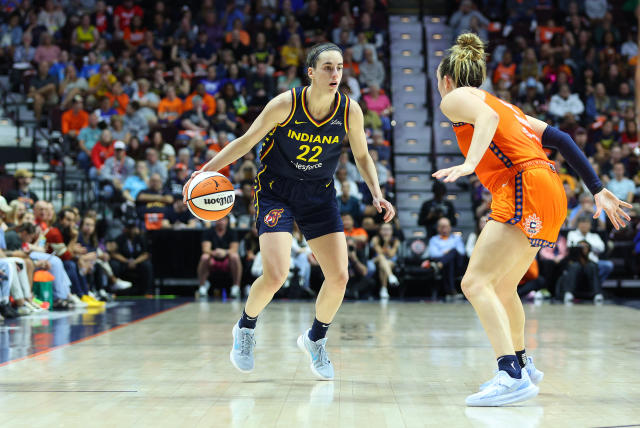
In a season marked by remarkable performances and intense scrutiny, Caitlin Clark of the Indiana Fever has emerged as a beacon of talent in the WNBA. Her standout rookie season has not only earned her accolades but also sparked a heated debate about the standards applied to female athletes in professional sports. Stephen A. Smith, a prominent sports commentator and analyst, has been vocal in his support for Clark, praising her resilience and skill while criticising the double standards that seem to plague her career.
Caitlin Clark’s Meteoric Rise
Caitlin Clark’s journey to the WNBA has been nothing short of extraordinary. After a stellar college career at the University of Iowa, where she became a household name, Clark entered the WNBA draft as the first overall pick in 2024. Her transition into professional basketball was seamless; she quickly established herself as a force on the court, leading all rookies in points (19.2 per game), assists (8.4), and three-point field goals made (122) during the regular season.
Clark’s impact on the Indiana Fever has been profound. Under her leadership, the team made its first playoff appearance since 2016, finishing the regular season with a balanced 20-20 record[1]. Despite facing tough competition, including a challenging Game 1 against the Connecticut Sun, where they suffered a 93-69 defeat, Clark managed to contribute significantly with 11 points, eight assists, and four rebounds in her playoff debut
Stephen A. Smith’s Praise and Critique
Stephen A. Smith has been an ardent supporter of Clark throughout her rookie season. He highlighted her ability to thrive under pressure and adversity, drawing parallels between her journey and those of legendary athletes across various sports. During his commentary, Smith emphasised that true greatness is defined not just by talent but by how one handles challenges both on and off the court [1].
Smith’s defence of Clark comes amid criticism from some quarters who argue that she is being overhyped. He passionately countered these claims by pointing out what he perceives as a double standard in how female athletes are treated compared to their male counterparts. “They act like there isn’t or hasn’t been legitimate resentment,” he stated, referencing critics who downplay Clark’s contributions while elevating those of other players[2].
Moreover, Smith pointed out that many of Clark’s detractors are former WNBA players who may feel threatened by her rapid rise to stardom. He argued that this resentment stems from envy rather than a genuine critique of her abilities or performance. His comments have sparked discussions about gender biases within sports media and how they affect perceptions of female athletes.
The Broader Implications for Women’s Sports
The controversy surrounding Caitlin Clark extends beyond individual performance; it raises critical questions about how women’s sports are perceived and valued in society. As Clark continues to break records and draw attention to the WNBA, her success highlights both progress and ongoing challenges within women’s athletics.
Clark’s rookie season has coincided with increased visibility for women’s basketball, contributing to record-setting attendance and television viewership numbers for the league [2]. However, despite these achievements, she still faces scepticism from some fans and analysts who question whether she can maintain her level of play under pressure.
This scepticism reflects broader societal attitudes towards women in sports, where female athletes often find themselves under greater scrutiny than their male counterparts. The expectation for women to not only perform but also represent their sport in a certain light can create an environment where criticism becomes more personal than professional.
A New Era for Women’s Basketball?
As Caitlin Clark continues to navigate her rookie season in the WNBA playoffs, she stands at a crossroads that could define not only her career but also the future of women’s basketball. With Stephen A. Smith championing her cause and calling attention to the double standards faced by female athletes, there is hope that conversations around gender equality in sports will gain momentum.
Clark’s journey is emblematic of a new generation of female athletes who are breaking barriers and challenging outdated perceptions about women’s capabilities in competitive sports. As she steps onto the court for future games, all eyes will be on her—not just as an athlete but as a symbol of progress for women in sports.
In this pivotal moment for women’s basketball, Caitlin Clark represents more than just individual talent; she embodies the potential for change within a sport that is still fighting for recognition and respect on par with men’s leagues. As fans rally behind her and analysts like Stephen A. Smith continue to advocate for fair treatment of female athletes, it becomes increasingly clear that Clark’s impact will resonate far beyond her statistics—she is poised to shape the narrative around women’s sports for years to come.
The unfolding story of Caitlin Clark is not merely about basketball; it is about redefining greatness in sports—a narrative that deserves attention as much as it demands respect.
Leave a Reply